
Congestive Heart Failure (CHF) in Dogs- A Life Saving Guide to Pet Parents
Does your four-legged companion push themselves more than usual? Do they have night coughs or breathing heavily after playing? These may not be the effects of old age alone, because sometimes it may be a symptom of Congestive Heart Failure (CHF). CHF is a disease that thousands of dogs presently face each year. This Guide to CHF in Dogs will provide you all information you need to know. It includes symptoms, Causes, Diagnosis, Treatment Thoughts and Procedures, Natural Remedies and Prevention. This blog will cover the case when your pet is recently diagnosed as also when you are undertaking proactive research to make your pet healthy.
What is Congestive Heart Failure (CHF )?
Congestive Heart Failure (CHF) is a disorder associated with the scenario that does not allow the heart to pump blood successfully. This causes the accumulation (congestion) of the fluid in the chest, the lung, or in the rest of the body. The heart valve disease, the disease of the heart, congenital defects, or hypertension can trigger CHF. CHF dogs exhibit symptoms such as the following: cough, difficulty breathing, feeling of tiredness, and bloated abdomen.
CHF Pathophysiology:
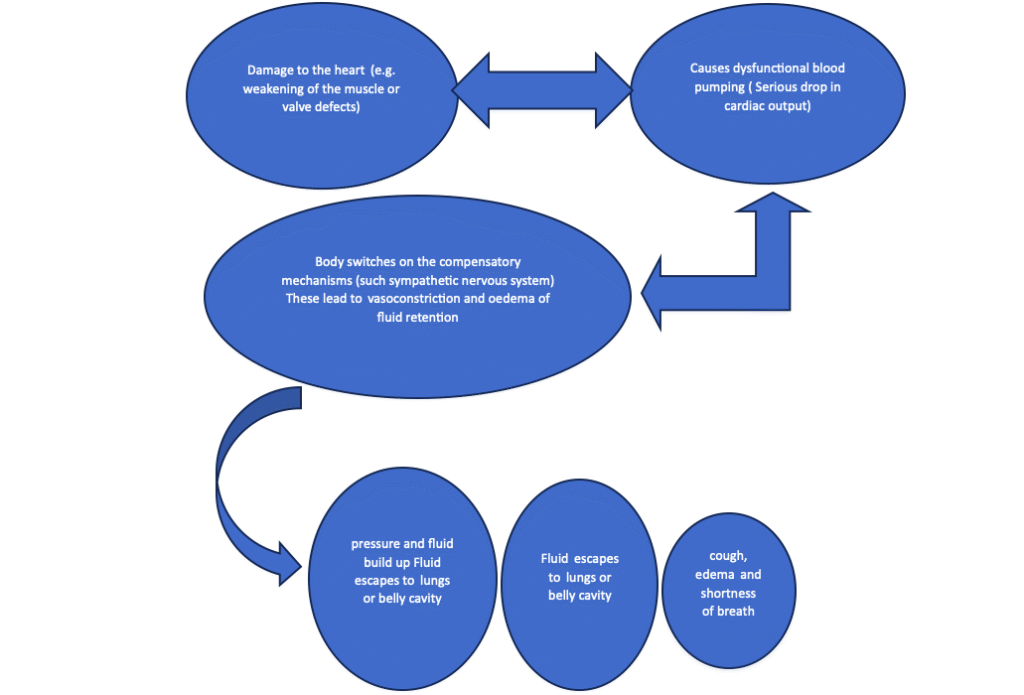
Congestive Heart Failure (CHF) in Dogs, Caused by What?
CHF may be genetic in origin or as a result of lifestyle or as a sequel to other forms of health problems. The two most prevalent root causes are given below:
| Dilated Cardiomyopathy (DcM) | Degenerative Mitral Valve Disease (DMVD) |
| DCM is a condition that affects your heart muscles making them lose their thickness, become extended and weak normally on the walls of the heart (particularly the left ventricle). | DMVD is one of the chronic illnesses that occur when the mitral valve (between left atrial and ventricular chambers) thickens and leaks gradually. |
| The Way It Can Result in CHF: The heart muscle becomes weak so it can not contract well. This implies that the amount of blood that the heart pumps out to the body with its beating reduces with time. The blood starts accumulating to the lungs and even the abdomen. As time progresses, there is fluid accumulation (oedema) of these areas – typical of CHF. | The Way It Causes CHF: The valve between the chambers does not close as the blood leaks back in the left atrium. The resultant effect is this back flow which makes the heart to exert itself in an attempt to move the blood forward. The left side of the heart becomes large with time and the pressure is again accumulated in the lungs. The resultant effect is pulmonary oedema (liquid in the lungs) which is one of the characteristic signs of CHF. |
| Root Causes: • Hereditary tendency • Deficiency of nutrients (e.g. taurine or carnitine) • Other connections with grain-free diets (controversial under investigation) | Root Causes • Degeneration of the mitral valve genetically • Wear and tear due to ageing • Sometimes, infections such as endocarditis can cause them rarely |
| Major Indicators of DCM: Lethargy • Fast respirations • Coughing • Intolerance to exercise • Unexpected faintings or collapsing | Major Indicators of DCM: • Coughing regularly (particularly at night time) • shortness of breath Reduced energy • Distended stomach (at late stages) • Heart murmur (which is usually seen as the first hint) |
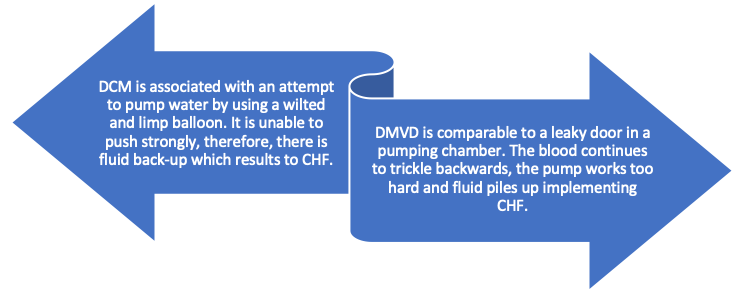
Breeds at High Risk:
- Doberman Pinschers
- Great Danes Mainly associated with
- Boxers Dilated Cardiomyopathy (DCM)
- Irish Wolfhounds
- Cavalier King Charles Spaniels
- Dachshunds Mainly associated with
- Poodles Degenerative Mitral Valve Disease (DMVD)
- Chihuahuas
- Other small/toy breeds over age 7
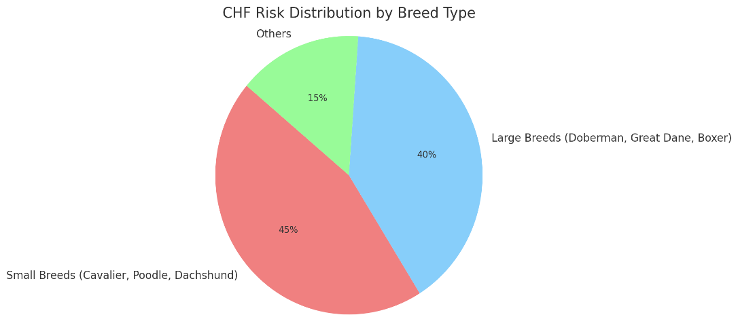
Other Root Causes Are:
Congenital Heart Defects
Congenital heart defects are the wrong way of doing heart muscles and bad connections and bad heart ventricles.
They include structural abnormalities at birth, which include:
- Patent ductes arteriosus (PDA)
- Ventricular septal defect (VSD)
- Pulmonic stenosis
These heart flaws interfere with blood flows in the heart. They eventually develop enlargement of some heart chambers and weaken the heart muscles due to overworking which causes CHF with time.
Heartworm Disease
Heartworms are parasites which reside in the heart and arteries into the lungs. Growing in size, they obstruct the movement of blood, inflame the heart, and hurt heart valves and other vessels in the lungs. It is difficult to pump blood due to which they become full of fluid and suffer CHF particularly in cases where it has not been treated or the condition is exacerbated.
Hypertension/High Blood Pressure
In chronic high blood pressure of a dog, the heart is forced to work harder to pump blood against the higher blood pressure. This additional load makes the heart muscle become thickened or stretched to ensure less efficiency and CHF, particularly left-sided CHF associated with fluid in the lungs.
Pericardial Effusion (Fluid Around the Heart)
This is whereby the fluid would collect in the pericardial sac (a membrane that surrounds the heart). The heart is pressed by that fluid, and the chambers do not fill and pump well. This eventually fails to circulate which causes symptoms of CHF such as weakness, swelling, and respiratory issues.
Irregular Heart Beats (Arrhythmias)
Metabolic Cramping causes an abnormality in the heartbeat. Or the heart beats too fast or too slow or irregularly due to arrhythmias. This interferes with the severity and timing of heartbeats making them pump less blood per heartbeat. This may lead to the heart muscle fatigue and subsequently CHF after some time.
Tumors or Infections (e.g., Endocarditis)
- Cancer of the heart or the surrounding areas may block circulation, or it may spread into the heart
- Endocarditis refers to infection of the inner parts of the heart, mostly initiated by the bacteria in the blood (usually through poor dental care). These diseases will cause harm to the heart valves or the heart muscle by causing leaks or making contractions weak which can also be the causes of CHF in case it is not attended to.
Deficiencies of Nutrients (Taurine, in particular)
Taurine is a necessary amino acid that is required for the normal functioning of the heart, especially in some breeds such as Cocker spaniel and the golden retriever. Taurine deficiency may cause dilated cardiomyopathy (DCM), in which the heart becomes thin, stretched, and weak. Lacking the strength to pump blood, CHF finally occurs.
Signs & Symptoms of CHF in Dogs:
The symptoms vary based on the left sided or the right sided CHF.
Left-Sided vs Right-Sided CHF
| Type | What Happens | Where Fluid Accumulates |
| Left-Sided CHF | Blood backs up into lungs | Lungs (Pulmonary Edema) |
| Right-Sided CHF | Blood backs up in body | Abdomen & Limbs (Ascites/Swelling) |
Symptoms of CHF in Dogs with description
| Symptom | Description |
| Cough | Worse at night or after exercise |
| Difficulty Breathing | Due to fluid in lungs (pulmonary edema) |
| Fatigue | Less interest in play or walks |
| Pot-Bellied Appearance | Fluid in abdomen |
| Rapid Heartbeat | Compensation for low circulation |
| Collapse/Fainting | Due to low oxygen |
| Loss of Appetite | Especially in late stages |
| Restlessness at Night | Trouble breathing while resting |
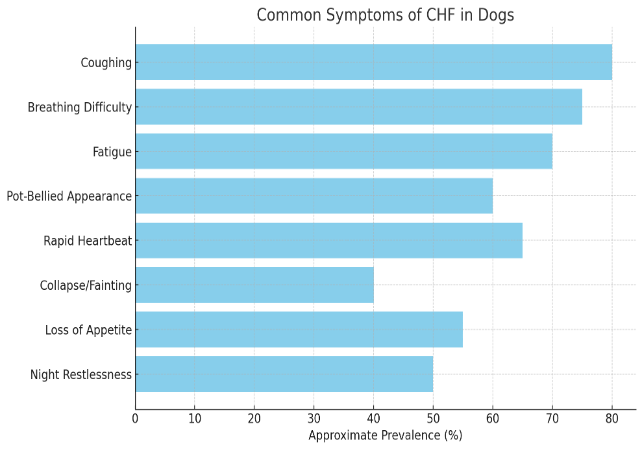
How does CHF affect heart Pumping Efficiency?
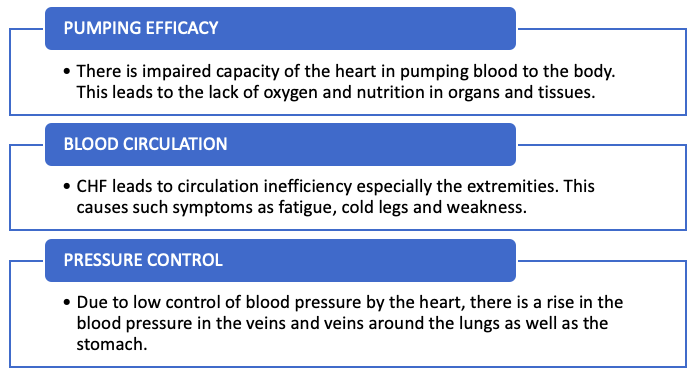
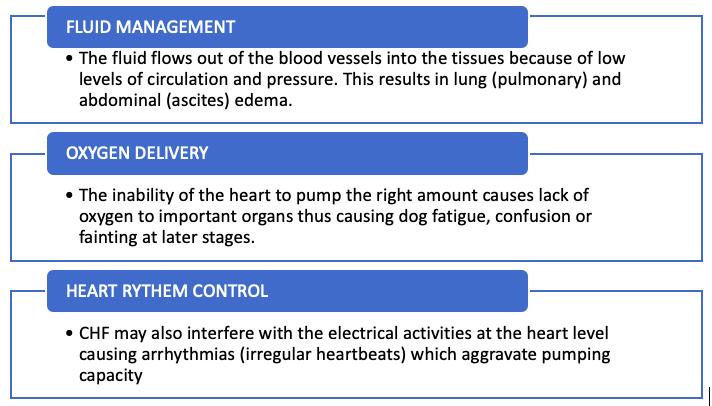
Left-Sided vs. Dogs Right-Sided CHF Left-Sided CHF It is the most prevalent type of CHF among the canines. What is Going on: Right-Sided CHF What is Going on: The heart cannot pump blood adequately to the lungs because the right side of the heart is unable to do so. The blood will stagnate in the abdomen and limbs leading to the accretion of fluid in cavities of the body. Lefthorn of the heart is not able to pump blood effectively to the body. Blood is forced back into the lungs resulting in amassing of fluids (pulmonary edema).
CHF vs Other Heart diseases of dogs:
| FEATURES | Congestive Heart Failure (CHF) | Chronic Heart Disease/ Other Heart Diseases |
| DEFINITION | A disease in which the heart fails to pump blood properly, causing occurrence of a fluid (lungs, abdomen, limbs). | It is defined as any physiologic or biomechanical defect of the heart. CHF is not as a matter of fact one of the results of heart disease. |
| Cause | a terminal phase under chronic heart disorders such as mitral valve disease (MVD) or dilated cardiomyopathy (DCM). | May consist of congenital heart defect, arrhythmias, heartworm or heart murmur without the onset of CHF. |
| Symptoms | Event of coughing, feeling of tiredness, difficulty in breathing, retention of fluids (swollen belly), fainting, restlessness. | May not experience any symptoms in the initial stages or may have light symptoms such as heart murmurs or irregular heartbeat. |
| Progression | Chronic and progressive and takes a long period of management | Certain conditions in the heart can be treatable, or even cured, when discovered imminently (e.g heartworm infection). |
| Treatment goals | Treatment aims at managing symptoms, progression limitation, and enhanced living. | It depends on the disease and may incorporate surgery (in the case of defects), medications, or lifestyle change. |
| Diagnosis | X-rays, echocardiograms and presence of fluids indicate diagnosis. | Diagnosis may involve identifications of a murmur or EKG or examinations of special heart infections or defects. |
Monitoring of CHF in Dogs in Hospital
In case of the severe symptoms of the dog with Congestive Heart Failure (CHF) or a sudden crisis, hospitalization is required to carefully observe the dog and stabilize it. They also have veterinary hospitals which can close monitor and assist the heart and other acute organs during this period of weakness.
What Is the Importance of Hospital Monitoring?
Hospital care will enable to monitor;
• Normalize breathing and cut fluid overload
• The dog responds quickly to adjust medications
• Keep a check on organ performances, in particular the kidneys and liver
• Early determination of complications such as arrhythmias or increase in fluid buildup
Hospital Monitoring Procedures:
| Procedure | Purpose |
| Oxygen Therapy | Helps relieve breathing difficulty |
| IV Diuretics | Quickly reduce fluid buildup |
| ECG | Monitor heart rhythm |
| Blood Tests | Evaluate kidney function and electrolytes |
| Blood Pressure | Ensure levels are stable |
| Ultrasound/X-ray | Visualize fluid and heart size |
| Urine Output monitoring | The indication of the kidney condition and effectiveness of the diuretics |
| Physical Examination | Respiratory effort, gum color, heart/lungs sounds checked |
Important Lab Parameters that were Monitored:
| Test | What it tells |
| BUN and Creatinine | Renal function (including diuretics) |
| Electrolytes (Potassium, Sodium) | Heart and organ functioning require this to be in balance |
| NT-proBNP (sometimes used) | A cardiac biomarker that measures heart stress |
What is the duration of my Dog in hospital?
A visit to the hospital lasts 24-72 h depending on the severity of the case. The stabilization of some dogs takes less time whereas others require more time to provide oxygen support and changes of medication.
The standard approaches to CHF in Dogs:
Although conventional medicine is unable to treat CHF, it is capable of reducing the rate at which it deteriorates and alleviating the quality of life. The usual drugs are:
1. Diuretics (e.g. Furosemide) Assists in draining of extra fluid in the lungs or abdomen yet can be stressful to kidneys.
2. ACE Inhibitor (e.g. Enalapril) Open blood vessels, lower blood pressure and relieve the heart effort.
3. Positive Inotropic agents (e.g., Pimobendan) Enhance the contractions of the heart and enrich blood circulation.
4. Vasodilators Dilate the blood vessels to expose less resistance and burden to the heart.
Observations that must be made: The dogs on these medications should be closely observed regarding kidney functionality and electrolytes imbalances.
Holistic and Natural Therapies of CHF in dogs:
There are natural therapies that are becoming common to aid the management of CHF.
1. Acupuncture & Acupressure Activates points of health, helps to dismiss the fluid and possibly enhances cardiac activity. Others present a visible increase in breath and vigour.
2. CBD Oil Researches have indicated that CBD can lower inflammation, correct heartbeat, and assist in maintaining cardiovascular health. Make sure to use full spectrum high-quality CBD designed specifically to pet.
3. Herbal Support
| Herb | Function |
| Dandelion | Mild diuretic, helpful to kidneys |
| Hawthorn | strengthens contractions, cardiac tonic |
| Motherwort | Relaxes the heart, and controls rhythm |
| Ginkgo Biloba | Enhances blood flow |
- Nutritional Support
- Coenzyme Q10 (CoQ10) is an antioxidant which enhances heart energy
- Taurine & L-Carnitine: Essential amino acids that enhance the strength of the heart muscles
- Multivitamin supplementation: Particularly for the dog which are taking long term medication.
Best Diet for Dogs With CHF
The heart can be influenced by diet to a great extent.
DO:
- Eat balanced uncooked or cooked food (by vet care)
- Introduce omega-3s (sardines doc: salmon, chia seeds)
- Add antioxidants such as blueberries, spinach and acai 3 times/week use cold-steeped green tea (1 tsp green tea for 1 cup of water)
AVOID:
- Wide-salt commercial food
- Heavy processed foods and kibble
- Table scraps that are heavy in fat or salty
Prevention of CHF in Dogs
CHF prevention is all about active heart care and a healthy lifestyle. Important Cautionary Advice:
• Provide high quality species-appropriate food
• Maintain moderate physical activities on daily basis
• Testing of blood pressure regularly
• Dental care (to avoid cardiac problems that are caused by infection)
• No obesity, please keep your dog slim!
• Prevent heartworm throughout the year
Pet-Pal Checklist
- CHF Risk Factors Small breed (Cavalier, Poodle, Dachshund)
- Big breed (Dobie, Great Dane) More than 7 year(s)
- Old History of coronary disease
- Bad dental conditions
- Unhealthy lifestyles like sitting down
- Illusive diet
- Mostly the dog is Tired or have a cough
In case you have checked two or more, you should inquire with your vet about a heart health screening!
Conclusion
Congestive heart failure in dogs is an intricate disease that can be managed. Dogs with CHF are able to spend longer and happier lives with a combination of traditional medicines, herbal treatments, and lifestyle adjustments.
The key? Identification in early stages, regular treatment, and a lot of love.
References
- Buzby, D. J. (2024, 03 27). Congestive Heart Failure in Dogs: Signs, Treatment, and Prognosis. From DR. BUZBY’S TOEGRIP:
- Congestive Heart Failure in Dogs. (n.d.). From HONEST PAWS:
- Congestive Heart Failure in Dogs. (2018, 08 13). From TODAY VETERINARY PRACTICE:
- Congestive Heart Failure in Dogs: Recognizing Urgent Signs. (2025, 05 02). From From the vet’s desk:
- CRUZ, D. S. (n.d.). What are the last stages of congestive heart failure in dogs? From PACIFIC AND SANTA CRUZ:
Dr. Mehwish Zeeshan
Dr. Mehwish Zeeshan, a passionate Veterinary Doctor and author at The Word Flick, blending science with stories to inspire and inform.
